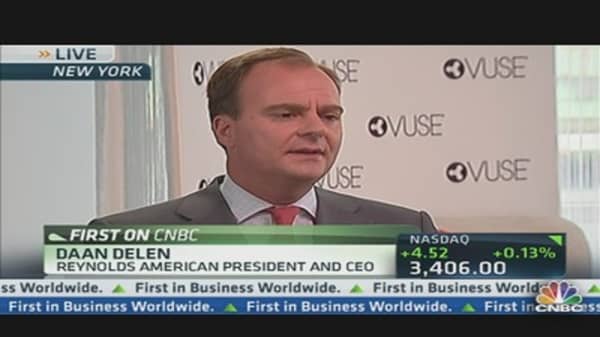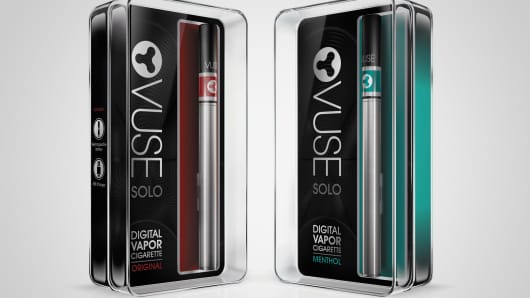At least one analyst, Bonnie Herzog of Wells Fargo, speculated earlier this year that consumption of electronic cigarettes would overtake those of traditional cigarettes within another decade.
"It's a fantastic business opportunity for us," Reynolds American president and CEO Daniel Delen told CNBC.
The market demands a better device, Delen said, as statistics show that while consumption of e-cigarettes remains relatively tiny, a significant 30 percent of consumers have tried an e-cigarette in the past six months.
"They're trying, but few consumers are actually converting," Delen said, blaming the lack of new users on dissatisfaction with existing products.
"But I think within a few short months, when we get feedback on the rate of conversion by people that are actually adopting this product and using it regularly, it will be much easier to make some estimates to how big this category can get over time," Delen said.
Reynolds expects the product to be "margin enhancing," Delen said, though he declined to estimate the size of its market. "It's a little bit early to actually wager a number, and say 'this could be this large,' " he said.
Asked if Vuse could cannibalize Reynolds' tobacco-smoking customers, Delen acknowledged that "we are very much targeting existing smokers, and there will be some cannibalization."
UBS tobacco industry analyst Nik Modi said the e-cigarettes category is relatively small compared with regular cigarettes, but "this is a very important category in growth terms."
Modi noted that Lorillard's e-cigarette line accounted for just "2 percent of total sales but for over 50 percent of revenue growth."
Reynolds could benefit in the same way, he said, but its bottom line could be adversely affected if Vuse doesn't sell well. "It'll be a big issue if they can't grab share, a big negative."
(Read More: Retailers Go Gaga for Groceries)
A selling point of electronic cigarettes, even if Big Tobacco doesn't blare it, is that they do not burn tobacco, a significant contributor to risks for cancer, and heart and lung disease. But the health effects of e-cigarettes—whose vapor is created from a nicotine-infused liquid—remain unclear.
The Food and Drug Administration is expected to issue regulations for the devices, which could affect sales and the price of the products.
Asked if Vuse would be marketed as a smoking-cessation tool, Herko said, "No, sir. Vuse is a tobacco product. And we're not making any health claims."
But Reynolds was happy to highlight Vuse's environmental benefits, pointing out that the product is not offered in disposable models, and the the company is creating a program to recycle both Vuse and competitors' products.





